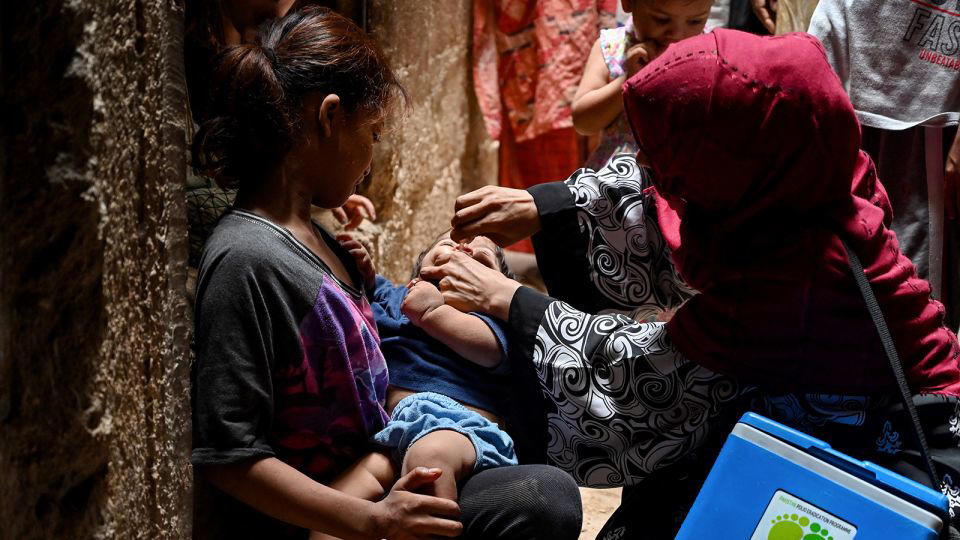A million children in Pakistan miss polio vaccine shots as cases spike

Polio is once again spreading in Pakistan, where officials say more than 1 million children missed their vaccination doses last month, underscoring the challenges they face in eradicating one of the world’s most intractable diseases.
Pakistani officials reported more than a dozen new polio cases in October, bringing the total number of infections this year to 39, compared to just six last year when the South Asian country appeared to be on the verge of eliminating the virus.
Ayesha Raza, the Focal Person to the Pakistani Prime Minister on Polio Eradication, blamed the recent uptick in cases on low vaccine uptake. She said about 1 million children missed their polio vaccinations in September, compounding a pre-existing immunity gap that has been growing since Covid-19 disrupted immunization efforts.
Polio is a highly infectious viral disease that mainly affects children under age 5. It attacks the nervous system and can cause paralysis, respiratory issues and even death.
It spreads mainly through contaminated water or food and there is no cure. But it can be prevented with a vaccine: polio cases worldwide have been reduced by more than 99% since the 1980s thanks to immunization campaigns.
Pakistan and neighboring Afghanistan are the only two countries where polio remains endemic, according to the World Health Organization (WHO), though the United Nations health agency has also recently warned of a resurgence of the deadly disease in Gaza following more than a year of Israeli bombardment of the Palestinian enclave.
Vaccination programs in Pakistan, home to more than 240 million people, have struggled in part due to a historical distrust of foreign health care providers. Allegations that US intelligence officials used a fake immunization program in the Pakistani city of Abbottabad as part of efforts to capture Osama bin Laden in 2011 inflamed those concerns.
Religious beliefs and a lack of awareness about the dangers of polio have also hindered public health efforts. International NGOs and Pakistani authorities have worked aggressively to dispel rumors and vaccinate children in recent years, but misinformation continues to spread.
Most of the recent cases in Pakistan are clustered in southwestern Balochistan province, which borders Afghanistan, where local officials say parents are reluctant to vaccinate their children due to widespread misinformation and distrust of health care providers.
Most of the children recently infected with the disease had been partially vaccinated but did not complete all four required doses, said Raza, the official.
Reported cases will also likely rise further as Pakistan steps up its surveillance efforts, Raza said.
“A lot of work is being done to fill the gaps that we’ve missed in the past,” she said.
The uptick in polio cases in Pakistan also comes as violent attacks against vaccination clinics have ramped up, targeting police and security officials.
Militants have targeted anti-polio campaigns in Pakistan for decades, with some claiming vaccines are a Western conspiracy used to sterilize children.
There have been 27 attacks on polio workers in Pakistan’s northwestern Khyber Pakhtunkhwa province this year, according to a CNN tally, which was confirmed by a police source.
In September, armed militants killed a police officer protecting a polio vaccination site in the northwest city of Bannu, prompting protests. A police officer and a polio worker were killed in another shooting that month in the northwest city of Bajaur.
Aftab Kakar, a representative for the Emergency Operation Center in Balochistan, said protests, insecurity and community boycotts had disrupted vaccine campaigns, “leaving a cohort of missed children who could sustain virus transmission.”
Health workers put a mark on a child’s finger to indicate if they’ve received the vaccine. But in some cases, children have been incorrectly marked as having been vaccinated when they haven’t, Kakar said.
Despite the recent surge in cases, Pakistani authorities are optimistic they can stop the spread of the disease. The country is launching a new nationwide polio vaccination campaign on October 28 with the aim of inoculating 45 million children under age 5.
“Polio eradication is Pakistan’s top priority,” Pakistan’s Polio Eradication Programme posted on social media.
“A unified plan with provinces aims to stop polio transmission by 2025.”
For more CNN news and newsletters create an account at CNN.com


